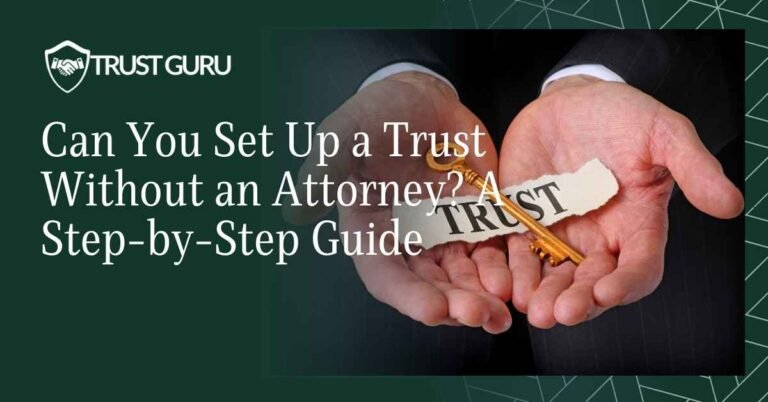To protect assets from creditors is essential for maintaining financial security, especially when faced with unforeseen risks like lawsuits, debts, or business liabilities. This article will guide you through practical and proven strategies to safeguard your wealth, ensuring it remains intact for your family and future needs.
By understanding these approaches, you can plan ahead, avoid legal pitfalls, and minimize financial exposure.
What You’ll Learn:
- The Importance of Asset Protection
- Common Challenges When Protecting Assets
- Key Strategies to Protect Your Assets from Creditors
- Why Professional Guidance is Critical
- How Trust Guru Can Help Protect Your Assets
Let’s dive into each strategy to equip you with the tools and knowledge needed to keep your assets safe.

The Importance of Asset Protection
Asset protection is the process of legally safeguarding your wealth from potential claims by creditors, lawsuits, or financial judgments. Whether you’re a business owner, a homeowner, or someone planning for retirement, protecting your hard-earned assets ensures financial stability and peace of mind.
Without proper planning, your personal wealth – including your home, savings, and investments – can be exposed to risks. Taking proactive steps now can prevent financial stress later and help you preserve your legacy.
For a comprehensive approach to securing your assets, explore Trust Guru’s Asset Protection Trusts services. These tailored solutions are designed to safeguard your wealth from potential risks, ensuring long-term financial security and peace of mind.

Common Challenges When Protecting Assets
Before diving into solutions, it’s important to recognize the challenges many people face when trying to protect their assets:
- Lack of Knowledge About Legal Tools: Many are unaware of legal strategies like trusts, LLCs, or exemptions.
- Waiting Until It’s Too Late: Asset protection is most effective when done proactively, not after a claim arises.
- Misunderstanding Asset Protection Laws: Laws differ by state and asset type, creating confusion.
- Improper Use of Trusts or Legal Entities: Mismanagement can render tools like irrevocable trusts ineffective.
- Overlooking Homestead Exemptions: Valuable protections like homestead laws and retirement accounts are often underutilized.
- Fraudulent Conveyance Risks: Moving assets improperly can lead to legal repercussions.
- Balancing Accessibility and Protection: Striking the right balance between control and protection can be tricky.
Now that you know the common pitfalls, let’s explore the strategies you can implement to protect your assets.
In this article you will understand common challenges in asset protection and learn how to navigate risks like lawsuits, legal pitfalls, and creditor claims.

Key Strategies to Protect Your Assets from Creditors
Use Trusts to Shield Assets
One of the most reliable ways to protect assets from creditors is by using trusts. A trust is a legal arrangement where a trustee manages assets on behalf of a beneficiary. Trusts are critical for shielding assets from lawsuits and preserving wealth.
- Irrevocable Trusts for Asset Protection: Assets placed in an irrevocable trust are no longer considered part of your estate, making them inaccessible to creditors.
- Spendthrift Trusts: These trusts prevent beneficiaries from using trust assets to pay debts, providing an additional layer of protection.
Example: A couple places their family home into an irrevocable trust, shielding it from future creditor claims while ensuring it passes to their children.
Form a Limited Liability Company (LLC)
For business owners, forming a Limited Liability Company (LLC) is a smart way to protect personal assets from business-related debts or lawsuits. An LLC creates a legal separation between your personal finances and your business liabilities.
LLCs are a key part of financial risk management and legal asset protection strategies.
Benefits of an LLC:
- Shields personal assets like your home, car, and savings from business liabilities, reducing financial risks.
- Establishes a clear legal distinction between personal and business finances, ensuring only business assets are subject to claims.
- Provides operational flexibility and potential tax advantages, making it an effective tool for asset protection and business stability.
Example: A small business owner faces a lawsuit related to their business. Because their personal assets are separate, only the LLC’s assets are at risk.
Learn how forming a Limited Liability Company (LLC) can help protect assets from civil lawsuits and business-related liabilities.
Discover tailored strategies to safeguard your business assets from potential risks by visiting Business Asset Protection.
Maximize Homestead Exemptions
A homestead exemption allows you to protect a portion of your primary residence from creditors. While the amount varies by state, it can be a significant tool for real estate asset shielding strategies.
Steps to Utilize Homestead Exemptions:
- Check your state’s exemption limits.
- File for a homestead exemption, if required.
- Ensure your property qualifies as your primary residence.
Example: A homeowner in Texas, where homestead laws are generous, can protect their entire home from creditor claims.
Understanding and leveraging homestead exemptions can provide peace of mind, knowing your home is secure.
Leverage Retirement Accounts and Insurance Policies
Certain retirement accounts and insurance policies are legally protected from creditors. By strategically funding these accounts, you can shield your wealth while planning for the future. These accounts are an essential part of tax-efficient asset protection strategies.
Protected Assets May Include:
- 401(k) and IRA accounts
- Life insurance policies with specific beneficiaries
- Annuities (depending on state laws)
Example: An individual facing a creditor claim has their savings secured in a retirement account, which is legally exempt from seizure.
Discover how 401(k) plans and IRAs offer legal protections from creditors under federal law.
Ensure your wealth is protected with tax-efficient strategies that optimize financial security and compliance. Explore expert guidance at Tax Compliance Services.
Plan Ahead to Avoid Fraudulent Conveyance
While transferring assets to protect them is a common strategy, it must be done carefully to avoid accusations of fraudulent conveyance. This occurs when assets are moved specifically to evade creditors.
Estate planning to avoid creditors is essential to ensure compliance while protecting wealth.
Tips to Avoid Fraudulent Conveyance:
- Transfer assets well before any claims or legal action arise.
- Document the reasons for the transfers.
- Work with a professional to ensure all steps are legal and valid.
Example: A business owner sets up an irrevocable trust years before facing any financial issues, ensuring the transfer cannot be challenged.
Proactive planning is key to ensuring your strategies hold up under legal scrutiny. For assistance with compliance and legal risk oversight, visit Legal Compliance & Risk Oversight.
Avoid fraudulent transfers by understanding how creditors can challenge improper asset transfers.

Why Professional Guidance is Critical
Asset protection involves complex laws and financial tools that can be challenging to navigate alone. Partnering with experienced professionals ensures your strategies are effective, compliant, and tailored to your unique situation.
At Trust Guru, we specialize in creating personalized solutions that help individuals and families protect their wealth through trust management for wealth preservation and legal compliance strategies.

How Trust Guru Can Help Protect Your Assets
Trust Guru is known for its fast response times and quality service in safeguarding clients’ wealth. Our team of professionals provides practical and actionable advice to ensure your assets are protected from creditors.
Why Choose Trust Guru?
- Expertise in creditor protection trust services
- Personalized strategies for wealth preservation techniques
- Reliable guidance tailored to your needs
At Trust Guru, we specialize in creating personalized solutions that help individuals and families protect their wealth through Trustee Services.
Final Thoughts
Taking steps to protect assets from creditors is not just about securing your wealth – it’s about safeguarding your family’s future, minimizing risks, and achieving financial peace of mind. By leveraging proven strategies like trusts, LLCs, and exemptions, you can shield your hard-earned assets from potential claims. For expert guidance and trusted solutions, contact Trust Guru today.













